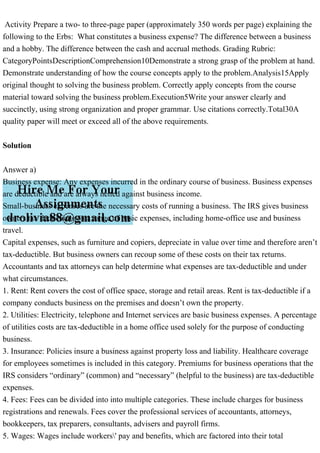
Activity Prepare a two- to three-page paper (approximately 350 word.pdf
- 1. Activity Prepare a two- to three-page paper (approximately 350 words per page) explaining the following to the Erbs: What constitutes a business expense? The difference between a business and a hobby. The difference between the cash and accrual methods. Grading Rubric: CategoryPointsDescriptionComprehension10Demonstrate a strong grasp of the problem at hand. Demonstrate understanding of how the course concepts apply to the problem.Analysis15Apply original thought to solving the business problem. Correctly apply concepts from the course material toward solving the business problem.Execution5Write your answer clearly and succinctly, using strong organization and proper grammar. Use citations correctly.Total30A quality paper will meet or exceed all of the above requirements. Solution Answer a) Business expense: Any expenses incurred in the ordinary course of business. Business expenses are deductible and are always netted against business income. Small-business expenses are the necessary costs of running a business. The IRS gives business owners tax deductions on a range of basic expenses, including home-office use and business travel. Capital expenses, such as furniture and copiers, depreciate in value over time and therefore aren’t tax-deductible. But business owners can recoup some of these costs on their tax returns. Accountants and tax attorneys can help determine what expenses are tax-deductible and under what circumstances. 1. Rent: Rent covers the cost of office space, storage and retail areas. Rent is tax-deductible if a company conducts business on the premises and doesn’t own the property. 2. Utilities: Electricity, telephone and Internet services are basic business expenses. A percentage of utilities costs are tax-deductible in a home office used solely for the purpose of conducting business. 3. Insurance: Policies insure a business against property loss and liability. Healthcare coverage for employees sometimes is included in this category. Premiums for business operations that the IRS considers “ordinary” (common) and “necessary” (helpful to the business) are tax-deductible expenses. 4. Fees: Fees can be divided into into multiple categories. These include charges for business registrations and renewals. Fees cover the professional services of accountants, attorneys, bookkeepers, tax preparers, consultants, advisers and payroll firms. 5. Wages: Wages include workers' pay and benefits, which are factored into their total
- 2. compensation. Pay for contractors and subcontractors are in this expense category, as well. Wages are tax-deductible. 6. Taxes: Local business taxes and business property taxes are deductible on a federal tax return. 7. Interest: The cost of borrowing money, or interest, for loans, credit and mortgages for business use is a tax-deductible expense. 8. Supplies: Common office items such as paper, pens, pencils, file folders, paper clips and ink cartridges are recurring expenses that are tax-deductible. 9. Depreciation: Capital expenses aren’t tax-deductible, but business owners can recoup a percentage of the costs each year by calculating the depreciation costs on their tax returns. Standard office equipment, such as computers, copiers, fax machines and scanners, depreciate over time. Large machinery, such as tractors and vehicles, also depreciate. 10. Maintenance: The costs of cleaning work areas and repairing equipment, such as computers, are tax-deductible. 11. Travel: Business travel expenses include bus, airline and train tickets; parking fees; and car rentals. Car expenses covering business activities are tax-deductible. If a car is used for both personal and business purposes, only the business expense is tax-deductible. Conferences and conventions can be categorized under either travel or “training” expenses. 12. Meals and Entertainment: Both meals and entertainment are tax-deductible if they’re used to engage customers, employees or clients in business activities. 13. Training: Training expenses include courses, books, seminars, programs offering continuing education units and any form of education that advances the skills of small business owners and their employees. Training expenses generally are tax-deductible. A tax attorney or accountant can help determine when expenses in this category aren't tax-deductible. Answer B) Hobbies are activities that incur expenses and are capable of generating a profit, but which are not pursued with the intent of profiting from the activity. Hobbies, under IRS guidelines, do not produce a profit for more than two out of the last five years and are not carried out in a manner consistent with an attempt to generate profit. The IRS typically examines four points that discriminate between hobby and Business activity are: If the answer is Yes, the activity is a Business activity or otherwise it is a hobby. Answer C) The main difference between accrual and cash basis accounting is the timing of when revenue and expenses are recognized. The cash method is most used by small businesses and for personal finances. The cash method accounts for revenue only when the money is received and for
- 3. expenses only when the money is paid out. On the other hand, the accrual method accounts for revenue when it is earned and expenses goods and services when they are incurred. The revenue is recorded even if cash has not been recieved or if expenses have been incurred but no cash has been paid. Accrual accounting is the most common method used by businesses. For example: Let's say you own a business that sells machinery. If you sell $5,000 worth of machinery, under the cash method, that amount is not recorded in the books until the customer hands you the money or you receive the check. Under the accrual method, the $5000 is recorded as revenue immediately when the sale is made, even if you receive the money a few days or weeks later. The same thing occurs for expenses. If you get an electric bill for $1700, under the cash method, the amount is not added to the books until you actually pay the bill. However, under the accrual method, the $1700 is recorded as an expense the day you get the bill.